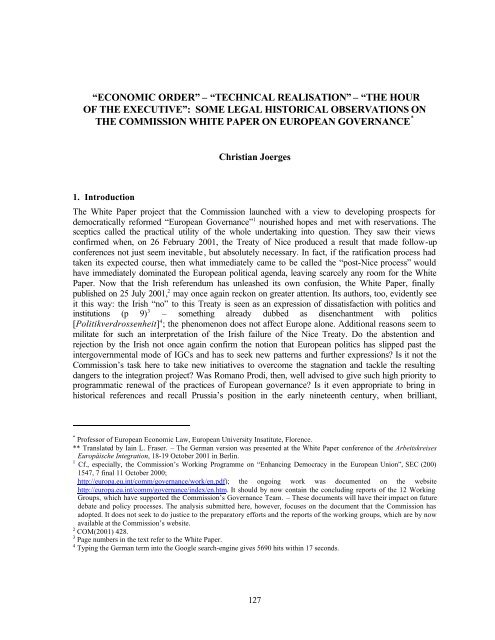Mountain or Molehill ?: - European University Institute
Mountain or Molehill ?: - European University Institute
Mountain or Molehill ?: - European University Institute
You also want an ePaper? Increase the reach of your titles
YUMPU automatically turns print PDFs into web optimized ePapers that Google loves.
“ECONOMIC ORDER” – “TECHNICAL REALISATION” – “THE HOUR<br />
OF THE EXECUTIVE”: SOME LEGAL HISTORICAL OBSERVATIONS ON<br />
THE COMMISSION WHITE PAPER ON EUROPEAN GOVERNANCE *<br />
1. Introduction<br />
Christian Joerges<br />
The White Paper project that the Commission launched with a view to developing prospects f<strong>or</strong><br />
democratically ref<strong>or</strong>med “<strong>European</strong> Governance” 1 nourished hopes and met with reservations. The<br />
sceptics called the practical utility of the whole undertaking into question. They saw their views<br />
confirmed when, on 26 February 2001, the Treaty of Nice produced a result that made follow-up<br />
conferences not just seem inevitable, but absolutely necessary. In fact, if the ratification process had<br />
taken its expected course, then what immediately came to be called the “post-Nice process” would<br />
have immediately dominated the <strong>European</strong> political agenda, leaving scarcely any room f<strong>or</strong> the White<br />
Paper. Now that the Irish referendum has unleashed its own confusion, the White Paper, finally<br />
published on 25 July 2001, 2 may once again reckon on greater attention. Its auth<strong>or</strong>s, too, evidently see<br />
it this way: the Irish “no” to this Treaty is seen as an expression of dissatisfaction with politics and<br />
institutions (p 9) 3 – something already dubbed as disenchantment with politics<br />
[Politikverdrossenheit] 4 ; the phenomenon does not affect Europe alone. Additional reasons seem to<br />
militate f<strong>or</strong> such an interpretation of the Irish failure of the Nice Treaty. Do the abstention and<br />
rejection by the Irish not once again confirm the notion that <strong>European</strong> politics has slipped past the<br />
intergovernmental mode of IGCs and has to seek new patterns and further expressions? Is it not the<br />
Commission’s task here to take new initiatives to overcome the stagnation and tackle the resulting<br />
dangers to the integration project? Was Romano Prodi, then, well advised to give such high pri<strong>or</strong>ity to<br />
programmatic renewal of the practices of <strong>European</strong> governance? Is it even appropriate to bring in<br />
hist<strong>or</strong>ical references and recall Prussia’s position in the early nineteenth century, when brilliant,<br />
*<br />
Profess<strong>or</strong> of <strong>European</strong> Economic Law, <strong>European</strong> <strong>University</strong> Insatitute, Fl<strong>or</strong>ence.<br />
** Translated by Iain L. Fraser. – The German version was presented at the White Paper conference of the Arbeitskreises<br />
Europäische Integration, 18-19 October 2001 in Berlin.<br />
1<br />
Cf., especially, the Commission’s W<strong>or</strong>king Programme on “Enhancing Democracy in the <strong>European</strong> Union”, SEC (200)<br />
1547, 7 final 11 October 2000;<br />
http://europa.eu.int/comm/governance/w<strong>or</strong>k/en.pdf); the ongoing w<strong>or</strong>k was documented on the website<br />
http://europa.eu.int/comm/governance/index/en.htm. It should by now contain the concluding rep<strong>or</strong>ts of the 12 W<strong>or</strong>king<br />
Groups, which have supp<strong>or</strong>ted the Commission’s Governance Team. – These documents will have their impact on future<br />
debate and policy processes. The analysis submitted here, however, focuses on the document that the Commission has<br />
adopted. It does not seek to do justice to the preparat<strong>or</strong>y eff<strong>or</strong>ts and the rep<strong>or</strong>ts of the w<strong>or</strong>king groups, which are by now<br />
available at the Commission’s website.<br />
2<br />
COM(2001) 428.<br />
3<br />
Page numbers in the text refer to the White Paper.<br />
4<br />
Typing the German term into the Google search-engine gives 5690 hits within 17 seconds.<br />
127

















